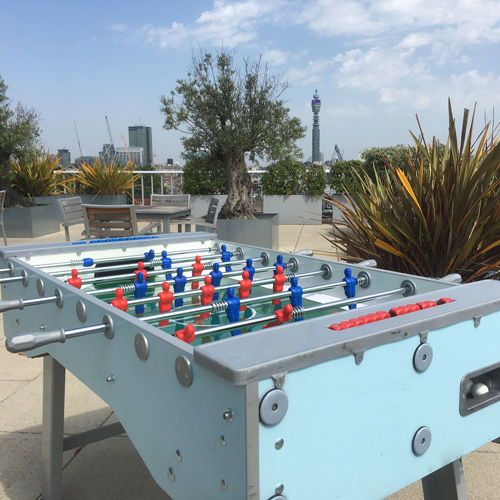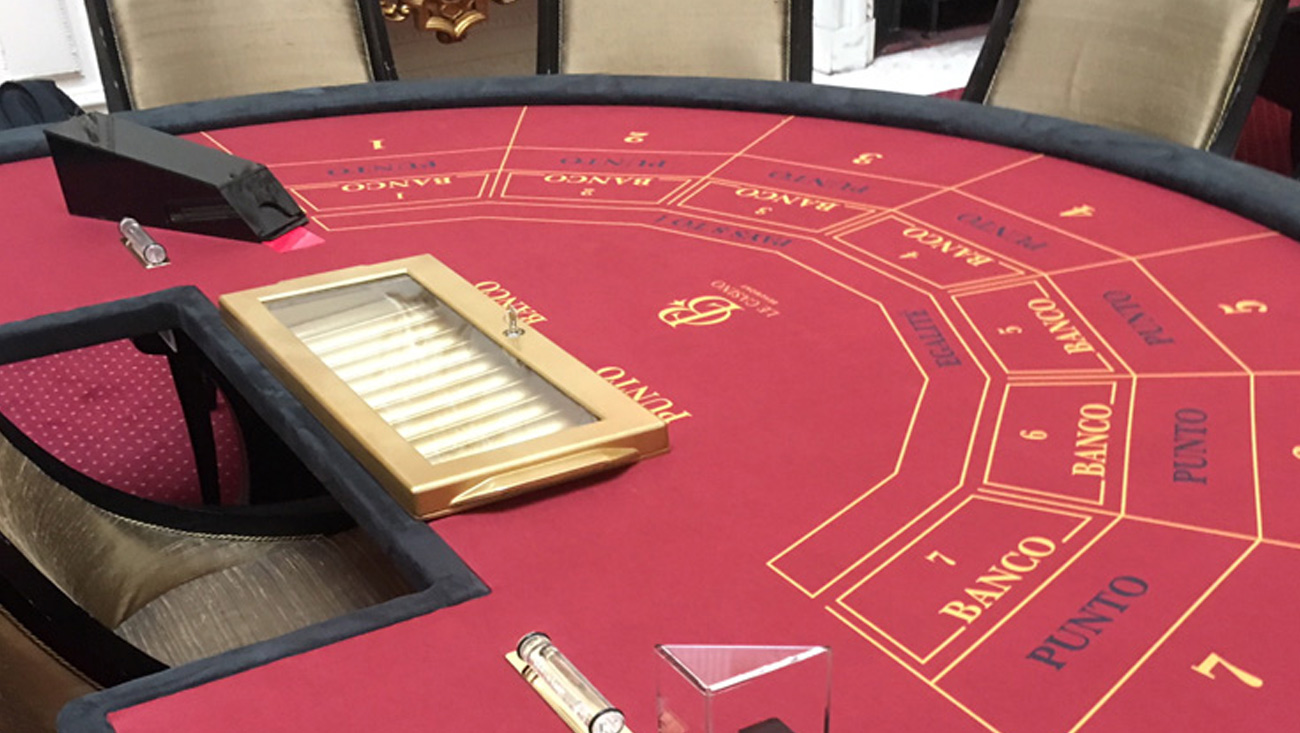
Table football—also known as foosball in some circles—is one of those games that seems simple on the surface but reveals a world of precision, etiquette, and structure once you step up to the handles. While it’s a universally loved pub and party game, true aficionados know that a proper match runs by a well-defined set of rules. These rules help maintain fairness, encourage skill, and make the game more enjoyable for everyone involved. Whether you’re gearing up for a tournament, hiring a table for an event, or just want to beat your mates without sparking a debate over dodgy goals and questionable spins, understanding the official and informal rules of table football is essential. In this blog, we’ll cover everything from serving the ball to scoring and winning, all in a clear and conversational way.
Setting Up the Game Properly
Before the first ball drops, it’s important that the table is set up correctly. A standard game is played on a regulation table, which includes eight rods—four per team—each fitted with rows of players designed to mimic real football formations. There are usually eleven players per side, arranged across goalkeeper, defence, midfield, and forward positions. Players take positions based on whether it’s a singles or doubles game. In singles, one player manages all four rods. In doubles, the team is split, with one handling defence and the other managing the midfield and attack. Once players are in place, the ball is served through a hole at the side of the table, typically by the team that lost the coin toss. After the first serve, the ball is put back into play by the team that conceded the last goal.
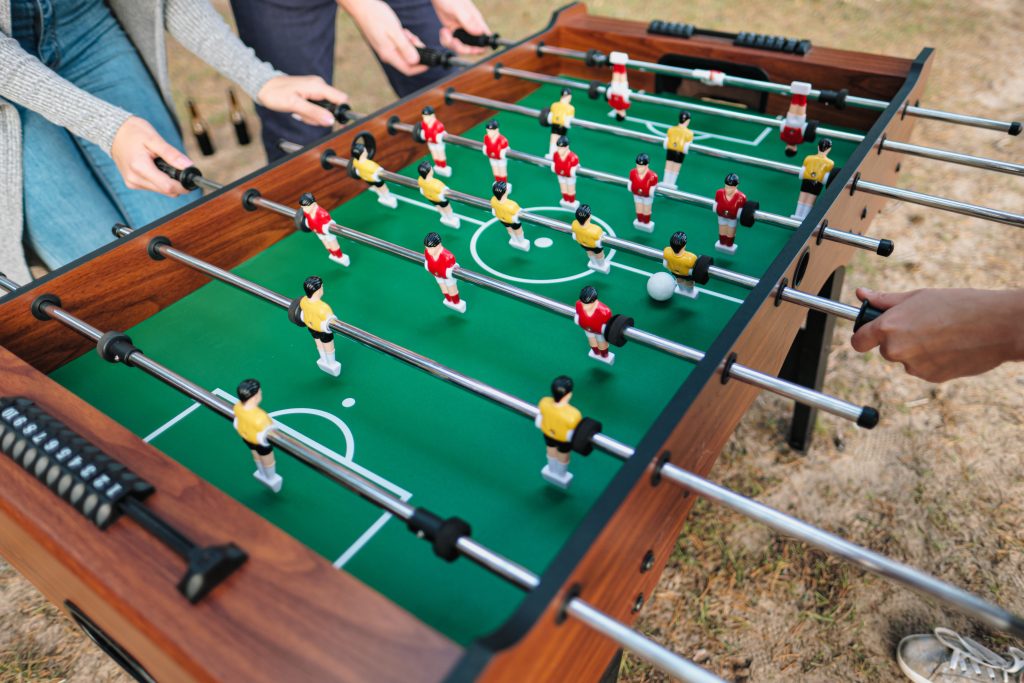
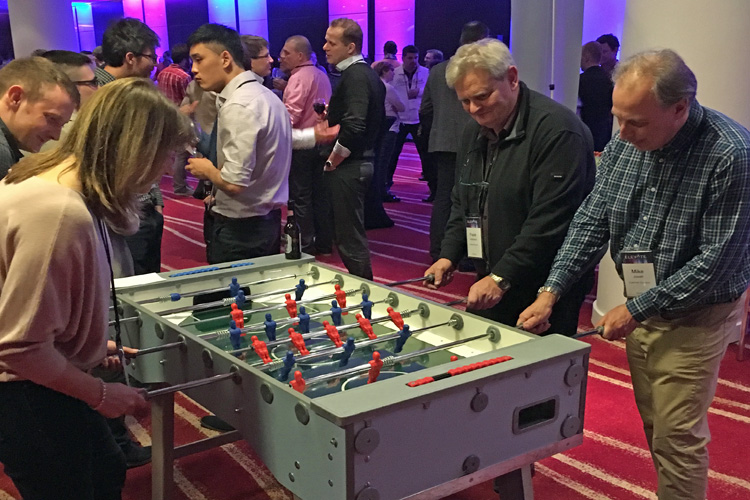
No Spinning Allowed
Arguably the most commonly broken rule in casual games—and the one that causes the most arguments—is the prohibition of spinning. In official table football rules, spinning is defined as turning the rod more than 360 degrees before or after striking the ball. It’s not just about being picky; the rule exists because spinning reduces control and removes the skill element from the game. A spinning rod flails at random, relying on luck rather than timing, precision, or strategy. To play properly, rods should be moved using controlled wrist movements and with deliberate purpose. This allows players to pass, trap, and shoot with finesse. Watching a skilled player navigate the pitch with accurate, non-spinning techniques is part of what makes table football such an entertaining and competitive sport.
Legal and Illegal Serves
Serving the ball isn’t just a formality; it’s part of the game’s flow. A legal serve requires the server to ask if both sides are ready before dropping the ball into play. In competitive settings, the server must also ensure that the ball touches the playing surface before it is touched by a player figure. Deliberately spinning the ball down the hole or bouncing it off the inside wall to gain an advantage is not allowed. If a serve is botched or if one side isn’t ready, the ball is re-served. In most friendly games, players tend to adopt a more relaxed approach to serving, but in serious matches, fair serves are expected and enforced.
Passing, Trapping, and Controlling the Ball
One of the finer arts of table football is ball control. Good players know how to trap the ball using the underside of a figure’s foot, hold it in place, and then pass it along the rods with intention. The idea is to build up to a goal in the same way real footballers work the ball up the pitch. A legal pass occurs when the ball moves cleanly from one row of players to another. Some rulesets, particularly in tournaments, don’t allow the ball to stop on the rod for too long—this is to prevent stalling or unfair time-wasting. However, short pauses to set up a pass or shot are usually accepted. If a player traps the ball and holds it for longer than the permitted time—often around ten seconds in midfield or fifteen in defence—it’s considered a foul and possession is turned over.
Shooting and Scoring Goals
Once the ball is near the goal, the attacking player can attempt a shot. The rules for shooting are straightforward: the ball must cross the goal line fully to be considered a goal. If it bounces back out, it still counts. However, goals scored by illegal means—such as spinning—are not valid. In many cases, if the defending team believes a goal was unfairly scored, they can call for a replay or ask for a referee’s judgment in organised play. After a goal is scored, the team that conceded restarts the game with a serve. In official matches, the ball is returned to the centre, and the side that conceded gets to serve again. Most games are played to a specific number of goals—often five, seven, or ten—depending on the format. Some tournament matches use time limits instead, with the winner being the team with the most goals at the buzzer.
Handling Dead Balls and Timeouts
Occasionally, the ball will end up in a position where neither side can reach it with any player figures. This is known as a “dead ball.” If this happens in the midfield area, the ball is re-served. If it goes dead near the goal area, the opposing team is awarded possession. Players aren’t allowed to shake or lift the table to dislodge the ball, as doing so is both unsportsmanlike and potentially damaging to the equipment. Timeouts can also be taken in tournament play, usually lasting 30 seconds. These are used to regroup, strategise, or simply catch your breath. Timeouts are typically limited to one per game or per player, depending on the ruleset in place. In casual games, timeouts are rare but might be agreed upon by players if needed.

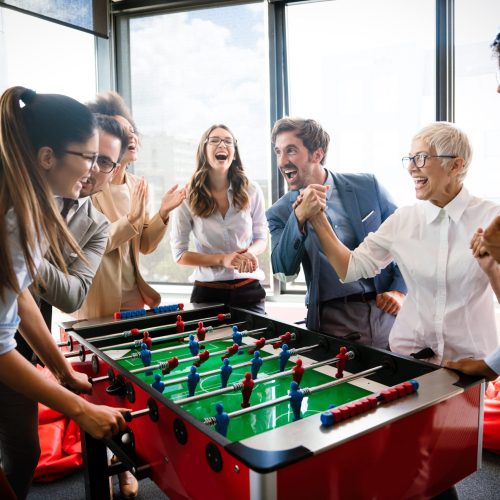
Switching Positions in Doubles
In doubles matches, communication and positioning are key. Players are allowed to switch positions between points, meaning the defender can become the attacker and vice versa. This is often done to take advantage of one player’s strength in shooting or defending. However, position switches must occur when the ball is not in play—usually after a goal or during a timeout. Switching mid-play is not allowed and would result in a penalty or loss of possession in formal games. Good teamwork requires clear roles and trust between partners, and frequent switching without reason can often do more harm than good.
Fouls, Penalties, and Sportsmanship
Like any sport, fouls can occur in table football. The most common fouls include spinning, jarring the table, reaching across the rods into the play area, and holding the ball for too long. In casual games, these fouls are often brushed off with a laugh or a friendly warning. But in more serious play, fouls can result in loss of possession, free shots for the opponent, or disqualification. Jarring refers to slamming or lifting the table in an attempt to affect the ball’s position. It’s strictly prohibited. Likewise, players aren’t allowed to distract opponents by waving hands in their field of vision, making noise, or slamming rods unnecessarily. A quiet, focused environment is ideal for competitive play. Good sportsmanship is just as important as knowing the rules. Shaking hands before and after a match, acknowledging good play from your opponent, and keeping a level head even when losing are all part of the game’s culture. Respect goes a long way in making matches enjoyable and fair.
Resolving Disputes
Not every match is played with a referee, especially in casual settings. That means disputes can arise. The best approach is to agree on the rules before the game starts and stick to them. If a disagreement occurs mid-game, the fairest resolution is often a replay of the point in question. In league or tournament matches, disputes are typically handled by a match official whose decision is final. Many players also agree on using a “gentleman’s rule” approach—where each side gives the benefit of the doubt and keeps things friendly. Since table football is often played in social settings, keeping the tone light and respectful ensures everyone has a good time, even if things get a bit competitive.
Adaptations for Events and Parties
When you hire a table football setup for an event, the rules might be tweaked slightly to suit the environment. For instance, games might be shortened to allow more people to have a go, or teams might rotate quickly to keep the atmosphere lively. Still, the core principles remain the same: no spinning, fair serving, and scoring only through skill. Having a set of printed house rules nearby can be a great way to avoid confusion, especially at larger gatherings. This not only promotes fair play but also helps newcomers pick up the game more quickly. Since many guests might be playing for the first time, the focus is usually on fun and inclusion rather than strict enforcement of competitive standards.
Why Knowing the Rules Matters
Understanding the rules of table football isn’t about spoiling the fun—it’s about enhancing it. When everyone’s on the same page, the game becomes smoother, more enjoyable, and far more satisfying. There’s a certain rhythm that flows through a proper match, where both sides play with mutual respect, skill, and intention. Rules also open the door to better gameplay. When players move past the chaotic spinning and scrambling, they begin to learn how to control the ball, pass with accuracy, and defend strategically. This deeper level of play transforms table football from a casual distraction into a genuinely exciting sport.
Viva Vegas: Your Go-To for Table Football Hire in London
If you’re planning an event and want to add a lively, interactive element that guests of all ages will love, then Viva Vegas is the name to know. As the leading table football hire company in London, Viva Vegas offers professional-grade tables delivered directly to your venue. Their service is seamless, reliable, and tailored to everything from weddings and birthday parties to office socials and corporate functions. With Viva Vegas on hand, you’re not just hiring a game—you’re bringing in an unforgettable experience built around fun, competition, and camaraderie.



